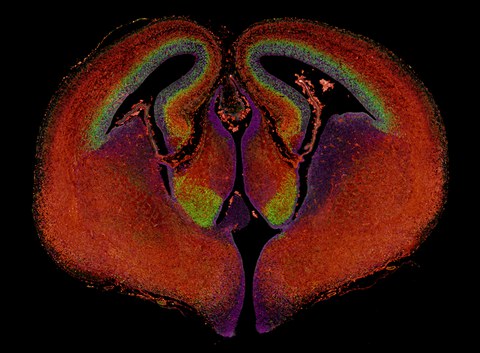Aug 24, 2020
Researchers discover protein that plays a key role in the formation of neurons

Cross section of a mouse brain at embryonic day 15 (neural stem cells in magenta, neuron progenitors in green, neurons in red)
An international team of researchers, including Dr. Tiwari from Queen’s University Belfast and Prof. Calegari from the CRTD of TU Dresden, has discovered the key role of a DNA-editing protein in the development of the brain: The expression of Phf21b within a defined time window of gestation and in a specific location in the brain, signals the birth of neurons from neural stem cells in the right place and at the right time, and in the right numbers. This may explain why this protein is known to cause intellectual disability and depression in adults. The findings have been published in Genes & Development. It has a major impact on the fundamental understanding of brain development and may lead to earlier diagnosis, and perhaps better treatments, for brain disorders.
To conduct their study, the researchers looked at brain samples to closely determine the development of various cell types within the brain. They found that removal of Phf21b stopped the production of neurons from neural stem cells and led to severe defects in brain development. The researchers also found the importance of this protein, in particular in the folding of DNA in cells committed to form neurons.
Brain development is a highly complex process that involves generation of various types of cells at defined time points and locations during embryogenesis. Interference in these processes may cause major diseases. Among these brain cell types, neurons are the working unit of the brain, designed to transmit information to other nerve cells and various tissues in the body, such as the muscles as well as storage of memory in our brain.
Publication:
Genes & Development: “Phf21b imprints the spatiotemporal Proof Only epigenetic switch essential for neural stem cell differentiation” by Amitava Basu, Iván Mestres, Sanjeeb Kumar Sahu, Neha Tiwari, Bimola Khongwir, Jan Baumgart, Aditi Singh, Federico Calegari, and Vijay K. Tiwari
